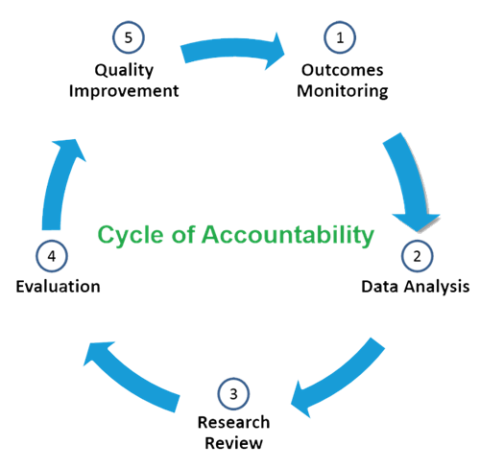Results-Oriented Accountability Overview
Background

The Department of Children and Families (DCF, Department) is committed to ensuring safety, timely permanency, and well-being for children. To do this, the Department’s Office of Child Welfare (OCW) works in partnership with a number of stakeholders across other agencies, local communities, and the legal system, to name only a few. While this extensive Child Welfare Community is very important to providing a holistic set of services and supports to children and families, it creates an increased level of complexity and need for a structured approach to measure, monitor, and evaluate the quality and effectiveness of interventions and practices across Florida’s child welfare system. Recognizing this need, in 2014 the Florida Legislature passed Florida Statute 409.997 setting the stage for the creation of an integrated plan for the development and implementation of a Results-Oriented Accountability Program (ROA, Program) to serve as the engine to instill a culture of transparency and accountability throughout the Child Welfare Community and to drive system-wide improvements in decision-making about the use of resources, quality and amount of services provided, and policies and practices which influence child and family outcomes.
Program Overview
The ROA design is based on a “cycle of accountability" framework focused on results and continuous quality improvement. The cycle of accountability relies on operationalizing five key activities to further advance the child welfare system’s efforts to evaluate performance on outcomes, identify new or promising interventions and strategies, review the validity of programs, and conduct continuous quality improvement to ensure the Child Welfare Community is learning and moving toward the accomplishment of goals which positively impact children and their families. The five activities included in the cycle of accountability are:
1 - Outcomes Monitoring:
activities to define, validate, implement, and monitor outcome measures throughout the Child Welfare Community
2 - Data Analysis:
approaches and procedures to critically study performance results to determine if variances discovered are in fact issues which should be explored further
3 - Research Review:
a series of activities to gather and validate evidence to support the development and implementation of interventions to address areas for improvement
4 - Evaluation:
activities to assess promising interventions for children and families to determine if deployment to a larger population is warranted
5 - Continuous Quality Improvement:
a series of actions to implement interventions across new domains, or to challenge, change, and test new assumptions about the underlying goals supporting the child welfare practice model
The ROA creates accountability and transparency by incorporating processes and tools for the dissemination of performance results to the Child Welfare Community and general public using the existing DCF website. The goal of Program accountability and transparency is to present accurate and timely performance information, along with an analysis of factors influencing trends, enabling stakeholders to view a true picture of the system and any potential needs for improvement.
Organizationally, the ROA resides within the OCW as a newly created Program Performance and Quality Management area. A Technical Advisory Panel which includes members from the Child Welfare Community advises the Department on the Program’s implementation. Program oversight will be provided by the ROA Governance Committee which will consist of representatives from the Department, Community-Based Care Lead Agencies, the Florida Institute for Child Welfare, Children’s Legal Services, Sheriff’s Offices, Contracted Providers, Office of the State Courts Administrator, and Community Partners.


